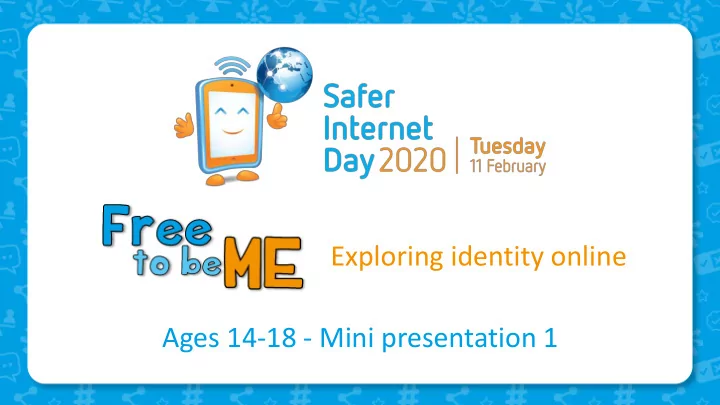

Exploring identity online Ages 14-18 - Mini presentation 1
Mini presentation 1 Are all identities equal online?
Represented positively online Represented negatively online
So…
The online identity quiz How well do you know ‘equality’ and ‘diversity’ online?
What is the most common language used online?
Yes? No. Everyone has different needs to be able No? to access and enjoy things online. Someone who is deaf, for example, would need subtitles when watching a video. Being equal online is all about treating people fairly.
What does it mean to see diversity online? Seeing only people from a certain background or culture commenting on things which relate to them. True diversity online should mean that we have online spaces where everyone Seeing a variety of different backgrounds, mindsets and feels welcome, included, represented and fairly treated. Nobody should expect to identities shown online through posts, adverts, be excluded from something based on who they are. accounts, comments etc. Making sure that everyone has their own separate space to be themselves online away from others. Not allowing people to discuss things which don’t relate directly to them.
Which of these would be considered ‘protected characteristics’ by the Equality Act 2010 and therefore unlawful to discriminate against? • Disability • Age • Gender reassignment All 9 of these are protected • Race characteristics under the • Sex Equality Act 2010. • Religion or belief • Sexual orientation • Pregnancy or maternity • Marriage or civil partnership
Is it ok to ask someone about a protected characteristic or part of their identity online? Yes? No? It depends. Some people are very open online with It depends? their identity, sometimes sharing things to educate others. However, not everyone will feel comfortable doing this or discussing personal things about themselves.
Which of these would be unfair treatment of someone else online? Treating someone less favourably because they have a protected characteristic. Making assumptions about someone based on protected characteristics. Excluding someone because of who they are friends with. Being hateful towards someone because they show support for others. Certain groups having an advantage compared to others online.
• Why does representation matter? ‘Racist’ cartoon turns woman black when she is cursed • What impact does proper representation have now and in the future? • Why does misrepresentation happen online? • Does it only happen 'Harmful' gender stereotypes in adverts banned online?
How can we challenge So… misrepresentation online?
• Look out for positive representation or people trying to challenge negative representation and give it a ‘like.’ • Make sure you follow a range of accounts to see and hear from others. • Think about what you share and how it might portray others. • Report negative comments/ posts. • Make use of campaign hashtags and graphics to raise awareness and support for others.
A place where everybody feels… SHARE How will you make the online world a more equal place?
Recommend
More recommend